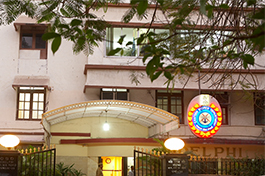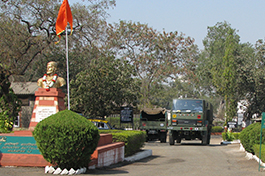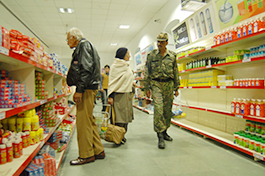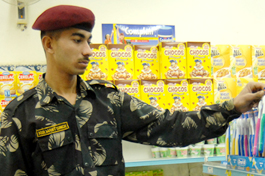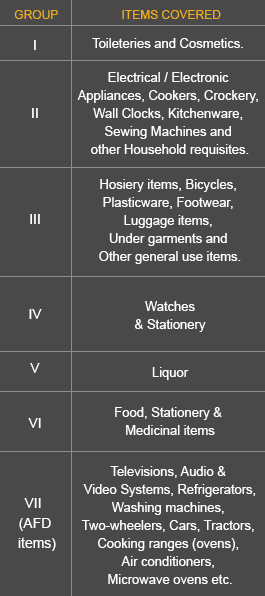The origin of CSD is traced back in the British era, when an Army Canteen Board in India was established on the similar model as that of Navy and Army Canteen Board in the Great Britain. It was established mainly to provide canteen facilities to troops in India through grocery shops and forces run by canteen contractors.
Later on, Army Canteen Board was replaced by the Canteen Contractors’ Syndicate (CCS) in 1927, which was floated in the form of a limited company under Government control, having its registered office at Karachi. It functioned with reasonable efficiency until the commencement of World War II. However, after World War-II broke out, the CCS could no longer cope up with the situation, due to heavy build up of British troops in India. Accordingly, on 01st July 1942, the Government of India, under the specific provision in the agreement, took over the functioning of this CCS by establishing Canteen Services (India) under Directorate of Whole Sale Trade and Indian Canteen Corps to handle the retail trade in operational areas and it worked well till the end of World War II. However, with the end of war, and home ward movement of British troops, the turnover of the organization shrank and with the pulling out of troops from the operational areas, the Indian Canteen Corps was disbanded and the staff was retrenched. In 1947, with the independence and partition of the country, this war time organization gave birth to two canteens i.e. CSD India and CSD Pakistan.
Thus the present Canteen Stores Department was born on 01 January 1948 with a working capital of Rs. 48 lakhs assigned to it from assets of its predecessor war time organization, on an experimental basis for three years. This situation was reviewed in 1950 and the experiment done by Government of India was found to be a huge success. The Department was accepted on a Government undertaking on a permanent basis and the concept of canteen facilities for Indian troops got its revival.
On 01 April 1977, this was converted from a Government undertaking to a full-fledged Government Department. This change is of historic importance, as thereafter, all the funds accumulated by the Department over the years were merged with the Consolidated Fund of India and its personnel became regular Central Government employees.
In 1948 the Canteen Stores Department had only four Area Depots namely Bombay, Calcutta, Maradnagar (which later moved to Delhi) and Bangalore at its inception. However seven decades later, the Department has 34 Area depots spread across the country. CSD is still a comparatively small Government Department but its geographically spread of 34 Area Depots can be compared to the largest organization.
To achieve highest level of consumer satisfaction by adopting pragmatic and proactive strategies to optimally utilize and develop human, infrastructure, material and financial resources of the Canteen Stores Department to withstand the dynamics of emerging economic realities of modern India.
To meet the aspirations of Armed Forces fraternity by making available latest and quality consumer products at a cheaper rate on All-India basis.
The Canteen Stores Department, CSD as it is commonly referred to, was created to provide 'easy access to quality products of daily use, at prices less than market rates' to the soldiers, ex-servicemen and their families.

Today, because of the surging aspirations of Service personnel and their families and the media exposure to the improving standards of living in our country, the CSD provides a range of quality branded and unbranded products from shoe brushes to microwave ovens and cooking oil to luxury cars. The portfolio has grown from just a few items of daily use in 1948 (when the Department was created) to over ten thousand products today. Information on all these products and brands is available on this web site through a "know-all" Search Engine for the benefit of the consumer.
The governing body of the Canteen Services in India is the Board of Control for Canteen Services (BOCCS) which is headed by Hon'ble Raksha Rajya Mantri (RRM) and has as members the Defence Secretary, Secretary Defence (Finance), the Quarter Master General (QMG), COP (Naval HQ), AOA (Air HQ). The Board is assisted by an Executive Committee of BOCCS while the day to day management of CSD is controlled by the General Manager CSD who is ex-officio Chairman of the Board of Administration. The General Manager (of the rank of Major General) is assisted by two Joint General Managers, seven Deputy General Managers, 18 Assistant General Managers , 5 Regional Managers and 34 Area (Depot) Managers and other Officers. Click here to know more about the three tier Management of CSD »
CSD like other chains has adopted best trade practices in all aspects of its operations but what distinguishes the Department from any and all other chains is that it is not driven by the profit motive!
CSD's trading operation is worked around seven basic product Groups.
Group I - Toiletries and Cosmetics
Group II - Household Requisites
Group III - General Use Items
Group IV - Watches and Stationery
Group V - Liquor
Group VI - Food & Medicinal Items
Group VII - 4 Wheelers, 2 Wheelers & White goods.
While all these products are procured based on demand from URCs, products in Group VII cannot be stored at URCs and neither can they be shelved! For this reason, CSD procures these items from the trade on behalf of the end user "Against Firm Demand" (AFD).
The Department works closely with more than 700 suppliers across the country for supply of the range of products seen on URC shelves and at select trade outlets (in the case of "AFD"). They are represented by leading multinationals, large Indian companies and many small manufacturers, including start-ups of ex-servicemen.
In order to achieve the best price for consumers, CSD encourages competition among suppliers.
The Department has 34 depots strategically located across India. This is the core strength of the CSD, which puts its operation in close proximity to the thousands of URCs it has mandated to serve. These Depots are the hub of the CSD chain.
Earlier, all supplies to these Depots were routed through the Base Depot in Mumbai, however, due to the expansion of the operation, suppliers are now given the option to supply locally to Depots closest to their manufacturing/supply centres. This has reduced lead time and improved overall operation of the Department.
Click here to see the CSD Depot network »
The "power centre" of CSD is Adelphi, a six storey structure in the commercial and financial centre of Mumbai alongside the famous Churchgate Station. Adelphi houses the office of the Chairman Board of Administration and General Manager of CSD and all leading functional departments including:
• Management Services
• Secretariat Branch
• Finance & Accounts
• Personnel & Administration
• Electronic Data Processing
• Stores Branch (GS, LIF and AFD sections)
